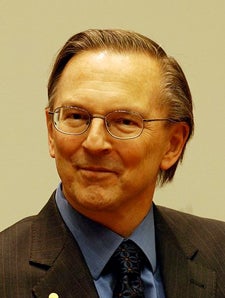Talk is sixth lecture of Honors Colloquium
The “Origins of Cellular Life” is the topic for the next University of Rhode Island Honors Colloquium. Jack Szostak, Professor of genetics at Harvard Medical School, professor of chemistry and chemical biology at Harvard University, and Alexander A. Rich Distinguished Investigator, Department of Molecular Biology, Massachusetts General Hospital, will deliver the address at 7 p.m. on Tuesday, Oct. 17 in Edwards Auditorium, 64 Upper College Road.
Szostak is most known for his contributions to the field of genetics, in particular for helping other scientists map the location of genes in mammals and developing techniques to manipulate genes. These findings play a pivotal role in the Human Genome Project, whose goal is to determine the sequence of nucleotide base pairs that make up human DNA and to map the genes from both physical and functional standpoints. Nucleotides form the basic structural unit of nucleic acids such as DNA.
In 2009, Szostak was awarded the Nobel Prize for Physiology or Medicine for the discovery of how telomeres protect the end of chromosomes from deterioration or fusion with other chromosomes.
Szostak is also credited with the construction of the world’s first yeast artificial chromosome, which has helped scientists map the location of genes in mammals. This discovery also helped to develop techniques for manipulating genes and was instrumental to the Human Genome Project. Szostak also developed the technique of in vitro evolution of RNA, which enables the discovery of RNAs with desired functions through successive cycles of selection, amplification and mutation. His lecture should offer insight on his research and many more topics related to the origins of cellular life.
Titled, Origins: Life, the Universe and Everything, this fall’s colloquium series addresses such questions as “Where did we come from? How did the universe begin? How did intelligent, rational beings arise? And from such humble beginnings, how did we develop a mind that can ask these big questions? Now in its 54th year, the colloquium is the University’s premier public lecture series, offering lectures on most Tuesday evenings through Dec. 5. Szostak’s lecture will be shown on the web at stream.uri.edu.
Olivia Ross, an intern in the Marketing and Communications Department at URI and public relations major, wrote this press release.
Colloquium Sponsors: Honors Program • URI Office of the President • URI Office of the Provost • 125th Anniversary Steering Committee • URI Foundation • The Mark and Donna Ross Honors Colloquium Humanities Endowment • The Thomas Silvia and Shannon Chandley Honors Colloquium Endowment • URI College of Arts & Sciences • URI College of Pharmacy • URI John Hazen White Sr. Center for Ethics and Public Service • URI Gender and Women’s Studies Program • URI Office of Community, Equity and Diversity • URI College of Engineering • URI College of the Environment and Life Sciences • URI College of Health Sciences • URI College of Business Administration • URI College of Nursing • URI Division of Student Affairs • URI Department of Communications and Marketing • URI Department of Publications and Creative Services • URI ITS Instructional Technology and Media Services • URI Feinstein College of Education and Professional Studies • George and Anne Ryan Institute for Neuroscience.

